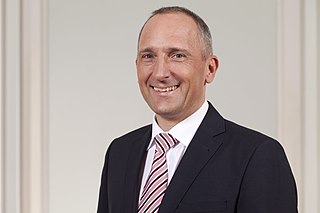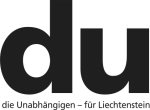
Liechtenstein is a principality governed under a constitutional monarchy. It has a form of mixed constitution in which political power is shared by the monarch and a democratically elected parliament. There is a two-party system and a form of representative democracy in which the prime minister and head of government is responsible to parliament. However the Prince of Liechtenstein is head of state and exercises considerable political powers.

Political identity came to the territory now occupied by the Principality of Liechtenstein in 814, with the formation of the subcountry of Lower Rhætia. Liechtenstein's borders have remained unchanged since 1434, when the Rhine established the border between the Holy Roman Empire and the Swiss cantons.

Vaduz is the capital of Liechtenstein and also the seat of the national parliament. The town, which is located along the Rhine River, has 5,450 residents.

The Progressive Citizens' Party is a national-conservative political party in Liechtenstein. The FBP is one of the two major political parties in Liechtenstein, along with the Christian-democratic Patriotic Union. Founded in 1918 along with the now-defunct Christian-Social People's Party, it is the oldest extant party in Liechtenstein.

The Patriotic Union is a Christian-democratic political party in Liechtenstein. The VU is one of the two major political parties in Liechtenstein, along with the national conservative Progressive Citizens' Party. The VU is the more liberal of the two parties, advocating constitutional monarchy and greater democracy. It is led by Jakob Büchel and has eight members in the Landtag.

The Free List is a centre-left political party in Liechtenstein. As of 2017, it has three seats in the Landtag of Liechtenstein and is represented in six of the eleven local councils. It was founded in 1985 and describes itself as social-democratic and green.

Lesbian, gay, bisexual and transgender (LGBT) people in Liechtenstein enjoy many, but not all, of the same rights as non-LGBT people. Same-sex sexual activity has been legal since 1989, with an equal age of consent since 2001. Same-sex couples have had access to registered partnerships since 2011, and discrimination on the basis of sexual orientation has been outlawed since 2016.
The German National Movement in Liechtenstein was a National Socialist party in Liechtenstein that existed between 1938 and 1945.

The Workers' and Peasants' Party was an agrarian political party in Liechtenstein. It contested the February 1953 elections, but received just 198 votes and failed to win a seat. The party did not contest the June 1953 elections, and has not contested any since.
Dr. Alexander Frick was a political figure from Liechtenstein.

The following outline is provided as an overview of and topical guide to Liechtenstein:
The Christian Social Party of Liechtenstein was a political party of Liechtenstein.

General elections were held in Liechtenstein on 3 and 5 March 1989. The result was a victory for the Patriotic Union, which won 13 of the 25 seats in the Landtag, which had been enlarged by 10 seats compared to the 1986 elections. Voter turnout was 90.88%. This was the first and only election contested by the Non-Party List, a political grouping attempting to prevent either the VU or FBP from forming a majority.

General elections were held in Liechtenstein on 1 February and 3 February 2013, using a proportional representation system. Four parties contested the elections; the centre-right Patriotic Union (VU) and Progressive Citizens' Party (FBP), centre-left Free List (FL) and newly created populist alliance The Independents (DU).

The Independents, is a right-wing populist Eurosceptic political party in Liechtenstein. In the 2013 parliamentary election, the first they contested, they won 29,740 votes (15.3%) and four seats in the Landtag. DU is headed by former Patriotic Union parliamentarian Harry Quaderer.
The Christian-Social People's Party, often shortened to People's Party, was a social liberal political party in Liechtenstein. Founded in 1918, it and the Progressive Citizens' Party (FBP) were the first political parties in Liechtenstein.

Liechtenstein Homeland Service was a political party in Liechtenstein that advocated corporate statism and the abolition of party politics.
This is an index of Liechtenstein related topics.










